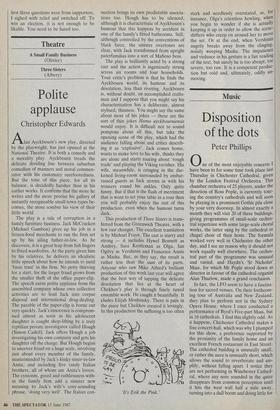Theatre
A Small Family Business (Olivier) Three Sisters (Albery)
Polite applause
Christopher Edwards
Alan Ayckbourn's new play, directed by the playwright, has just opened at the National Theatre. It is both a comedy and a morality play. Ayckbourn treads the delicate dividing line between suburban comedian of manners and moral commen- tator with his customary surefootedness. But the tone of this piece, for all its balance, is decidedly harsher than in his earlier works. It confirms that the more he , writes and the more precise his gallery of instantly recognisable small-town types be- comes, the more sombre his view of their little world.
The play is a tale of corruption in a family furniture business. Jack McCracken (Michael Gambon) gives up his job in a frozen-food merchants to run the firm set up by his ailing father-in-law. As he discovers, it is a great leap from fish fingers to fitted wardrobes. At the party given him by his relatives, he delivers an idealistic little speech about how he intends to instil `basic trust' in the firm. No petty thieving for a start, for the larger fraud grows from the smaller theft of the office paper-clip. The speech earns polite applause from the assembled company whose own collective activities are to lead Jack into corpse disposal and international drug-dealing. The parable of the paper-clip is borne out very quickly. Jack's innocence is comprom- ised almost as soon as his adolescent daughter is caught shop-lifting by a truly reptilian private investigator called Hough (Simon Cadell). Jack offers Hough a job investigating his own company and gets his daughter off the charge. But Hough begins to uncover fraud on a huge scale, involving just about every member of the family, masterminded by Jack's kinky sister-in-law Anita, and including five randy Italian brothers, all of whom are Anita's lovers. The cynicism, greed and ruthlessness with- in the family firm add a sinister new meaning to Jack's wife's cosy-sounding phrase, 'doing very well'. The Italian con-
nection brings its own predictable associa- tions too. Hough has to be silenced, although it is characteristic of Ayckbourn's humour that this happens by accident in one of the family's fitted bathrooms. Still, although controlled by the conventions of black farce, the sinister overtones are clear, with Jack transformed from upright paterfamilias into a sort of Mafioso boss.
The play is brilliantly acted by a strong cast and the action is ingeniously strung across six rooms and four households. Your critic's problem is that he finds the Ayckbourn world, its humour and its desolation, less than riveting. Ayckbourn is, without doubt, an accomplished crafts- man and I suppose that you might say his characterisation has a deliberate, almost stylised, thinness. You might say the same about most of his jokes — these are the sort of thin jokes Homo ayckbourniensis would enjoy. It is difficult not to sound pompous about all this, but take the opening scene of the play, which had the audience falling about and ethics describ- ing it as 'explosive'. Jack comes home. wants to make love to his wife, thinks they are alone and starts roaring about 'rough trade' and playing the Viking ravisher. His wife, meanwhile, is cringing in the dar- kened living-room surrounded by embar- rassed guests as Jack storms in with his trousers round his ankles. Only quite funny. But if that is the flash of merriment that is wont to set your table in a roar then you will probably enjoy the rest of this production, even when the humour turns dark.
This production of Three Sisters is trans- ferred from the Greenwich Theatre, with a few cast changes. The excellent translation is by Michael Frayn. The cast is starry and strong — it includes Hywel Bennett as Andrey, Sara Kestleman as Olga, Ian Ogilvy as Vershinin and Francesca Annis as Masha. But, as they say, the result is rather less than the sum of its parts. Anyone who saw Mike Alfred's brilliant production of this work last year will agree that the best way of tapping the delicate desolation that lies at the heart of Chekhov's play is through finely tuned ensemble work. He caught it beautifully. It eludes Elijah Moshinsky. There is pain in the piece but Chekhov created it lovingly. In this production the suffering is too often `It's Erik the Pink.' stark and needlessly overstated, as, for instance, Olga's relentless howling, when you begin to wonder if she is actually keeping it up in order to allow the scene- shifters who creep on around her to move the set. Or at the end, when Vershitun angrily breaks away from the clinging, noisily weeping Masha. The impatience and violence in his gesture is a fair reading of the text, but surely he is too abrupt, too severe, too raw. It is a competent produc- tion but cold and, ultimately, oddly un- moving.



























































 Previous page
Previous page